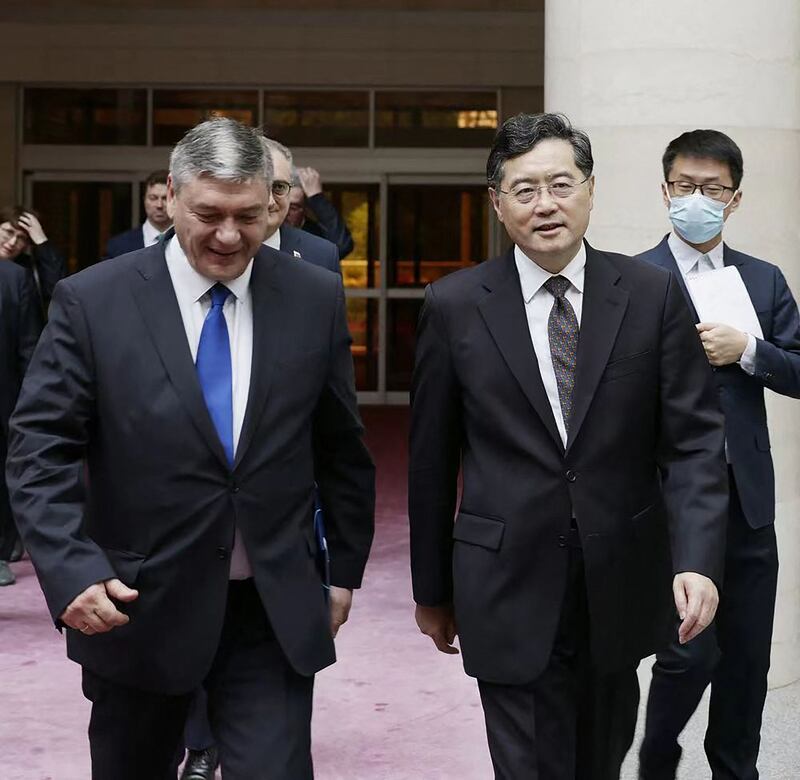China’s reactions to a weekend rebellion that President Vladimir Putin described as a threat to Russia’s very existence were muted in the aftermath of a chaotic chain of events that have been put on hold by a negotiated truce.
Although a deal between the Wagner Group and Vladimir Putin’s government was achieved on Saturday, averting what appeared to be an unfolding civil war, according to reports on Monday, both the major players were still out of sight.
Silence reigned over the future of Wagner’s 25,000-strong paramilitary army and its owner Yevgeny Prigozhin, while details of what was agreed between Prigozhin and Belarusian President Alexander Lukashenko were unknown.
China’s state media ignored the unfolding events on Saturday, but on Sunday state news agency Xinhua reported that the situation was in control due to the “wisdom” of Putin and his “overwhelming support from Russian society.”
Wen-Ti Sung, a nonresident fellow with the Atlantic Council's Global China Hub, sessional lecturer in the Australian National University's College of Asia and the Pacific and a member of the Australian Centre on China in the World, wrote in a series of Twitter posts that Chinese media was downplaying the events because Beijing is so invested in Putin as a long-term partner.
Sung added that social media commentary in China was “more diverse,” stating that the “majority of Chinese Weibo comments are concerned about [a] domino effect that if Russia goes, China may be next” and noting that the concern was that an internally divided Russia would mean there “would be no one else to share the burden of Western pressure.”
Talks in Beijing
Russian official, Deputy Foreign Minister Andrey Rudenko flew to Beijing on Sunday, just one day after the brief armed insurrection, and met with China’s Foreign Minister Qin Gang.
The matter was “Russia’s internal affair,” China’s Ministry of Foreign Affairs stated after the meeting, adding that China supports Russia in maintaining its national stability.
“As a friendly neighbor and comprehensive strategic partner in the new era, China supports Russia in maintaining national stability and achieving development and prosperity,” it said.
What Qin Gang and Russia’s diplomat discussed is unknown.

Analysts roundly agreed that a destabilized Russia is Beijing’s greatest fear concerning Putin’s invasion of Ukraine, which China has tacitly supported.
Russia is China’s key support in what it sees as a global order dominated by the U.S. and its allies.
Joseph Webster, a senior fellow at the Atlantic Council's Global Energy Center, described Prigozhin as "the devil Beijing doesn't know." He added, "The head of the Wagner mercenary group has a mercurial (arguably volcanic) temperament which the Chinese leadership could find difficult to manage."
Both Putin, who Xi has described as his “best, most intimate friend,” and Prigozhin appear to have been weakened by the events of the weekend, according to multiple analysts.
The uncertainty effect
John K. Culver, a nonresident senior fellow with the Atlantic Council's Global China Hub and a former Central Intelligence Agency senior intelligence officer, noted that when Xi said at Davos that "the world is undergoing changes unseen in a century" he "probably didn't include Putin's former caterer and mercenary army founder/funder Yevgeniy Prigozhin directing an armed assault toward Moscow."
Culver added, “For Xi and China, Russian internal turmoil and stumbles in the face of successful Western-backed Ukrainian military opposition and sanctions will further threaten greater isolation,”
Hal Brands, Henry Kissinger Distinguished Professor at Johns Hopkins University's School of Advanced International Studies and a senior fellow at the American Enterprise Institute said in an opinion piece that "President Xi Jinping needs a friendly, relatively strong Russia that can challenge American power in Europe while Beijing pushes its influence in Asia.
“He stands to lose a great deal from a Russia that falls into civil war, or one that is humiliated in Ukraine and convulsed by civil strife. The current unrest also raises the threat of conflict between ex-Soviet states in China’s backyard, such as Kyrgyzstan and Tajikistan.”

If nothing else is certain, as John "Buss" Barranco, the 2021-22 senior U.S. Marine Corps fellow at the Atlantic Council's Scowcroft Center for Strategy and Security, noted, commenting on Russia's invasion of Ukraine, "Once an army loses confidence in its leaders, morale collapses and the will to fight goes with it."
His comment echoed multiple sources that saw the weekend near mutiny, or revolt, as revealing Putin to have a weak hand, which has likely come as a surprise to Beijing.
Konstantin Sonin, Political economist and professor at the University of Chicago Harris School of Public Policy, noted on Twitter, "The June 23-24, 2023 plot is both a symptom of the falling Putin's regime and a blow to it. As anything that weakens Putin brings the end of the war closer, it also does."
Sung commented that it was possible that the weekend strife in Russia might spur Beijing to "reconsider how to optimize regime security and military effectiveness … [and] more importantly increase risk assessment of challenges for wartime civilian control over the military," adding that China might become more careful about initiating conflicts, in a likely reference to Taiwan.
Edited by Mike Firn.
